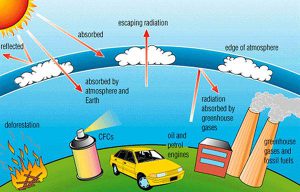
Inhaltsverzeichnis
Greenhouse effect? Schonmal gehört? Dieser Artikel beschreibt den greenhouse effect und dessen Gründe, sowie mögliche Lösungsansätze, was wir dagegen machen können. Der greenhouse effect gehört zum Themengebiet Energy der Sekundarstufe II. Weitere Themen findest du hier.
Der Treibhauseffekt ist ein natürlicher Prozess, bei dem die Atmosphäre von der Erde ausgehende Wärmestrahlung absorbiert und reflektiert. Diese Wärmestrahlung wird von Treibhausgasen, wie Kohlenstoffdioxid (CO2), Methan und Wasserdampf, aufgefangen und an die Erde zurückgestrahlt, wodurch die Temperaturen auf der Erde erhöht werden.
Der Treibhauseffekt ist für das Leben auf der Erde von entscheidender Bedeutung, da er dafür sorgt, dass die Temperaturen auf der Erde nicht zu niedrig werden. Ohne den Treibhauseffekt wäre die Durchschnittstemperatur auf der Erde etwa -18°C, was für das menschliche Leben unzumutbar wäre.
Allerdings kann ein zu starker Treibhauseffekt zu einer Erwärmung der Erde führen, was als Klimawandel bezeichnet wird. Der Klimawandel wird hauptsächlich durch den Anstieg der Treibhausgasemissionen verursacht, der durch menschgemachte Aktivitäten wie den Verbrennung von fossilen Brennstoffen und Landnutzungsveränderungen verursacht wird. Ein zu starker Treibhauseffekt kann zu einer Vielzahl von negativen Folgen führen, wie zum Beispiel zu häufigeren Hitzewellen, Stürmen, Dürren und Meereserhöhungen.
Um den Klimawandel zu verlangsamen oder zu bekämpfen, ist es wichtig, die Emissionen von Treibhausgasen zu reduzieren und Maßnahmen zur Anpassung an den Klimawandel zu ergreifen. Dies kann durch die Verwendung erneuerbarer Energien, die Verbesserung der Energieeffizienz und den Schutz von Wäldern erreicht werden, die als "grüne Lungen" wirken und CO2 aus der Atmosphäre entfernen.
The greenhouse effect refers to the process by which certain gases in the Earth's atmosphere, such as carbon dioxide, methane, and water vapor, trap heat from the sun and prevent it from escaping back into space. This process is called the greenhouse effect because it works in a similar way to a greenhouse, where the windows allow sunlight to enter but prevent the heat from escaping.
The greenhouse effect is a natural process that is essential for maintaining the Earth's temperature at a level that is suitable for life. However, human activities, such as the burning of fossil fuels and deforestation, have significantly increased the levels of greenhouse gases in the atmosphere, leading to an enhanced greenhouse effect. This has contributed to the warming of the Earth's surface and the overall trend of global warming.
The greenhouse effect has a number of impacts on the Earth's climate and environment, including more frequent heatwaves, droughts, and extreme weather events, such as hurricanes and floods. It also has consequences for ecosystems and agriculture, as well as for human health. Reducing greenhouse gas emissions and adopting renewable energy sources is essential for mitigating the negative impacts of the greenhouse effect and addressing the issue of climate change.
The greenhouse effect is caused by certain gases in the Earth's atmosphere, such as carbon dioxide (CO2), methane, and water vapor, that trap heat from the sun and prevent it from escaping back into space. These gases are called greenhouse gases because they act like the windows of a greenhouse, allowing sunlight to enter but trapping the heat inside.

The greenhouse effect is a natural process that is essential for maintaining the Earth's temperature at a level that is suitable for life. However, human activities have significantly increased the levels of greenhouse gases in the atmosphere, leading to an enhanced greenhouse effect. The main reasons for this increase in greenhouse gases are:
Reducing greenhouse gas emissions and adopting renewable energy sources is essential for mitigating the negative impacts of the enhanced greenhouse effect and addressing the issue of climate change.
There are a number of actions that individuals and governments can take to reduce greenhouse gas emissions and mitigate the negative impacts of the greenhouse effect. Some of the most effective ways to reduce greenhouse gas emissions include:
It is important for individuals and governments to take action to reduce greenhouse gas emissions and address the issue of climate change. By taking these steps, we can help mitigate the negative impacts of the greenhouse effect and create a more sustainable future for all.
